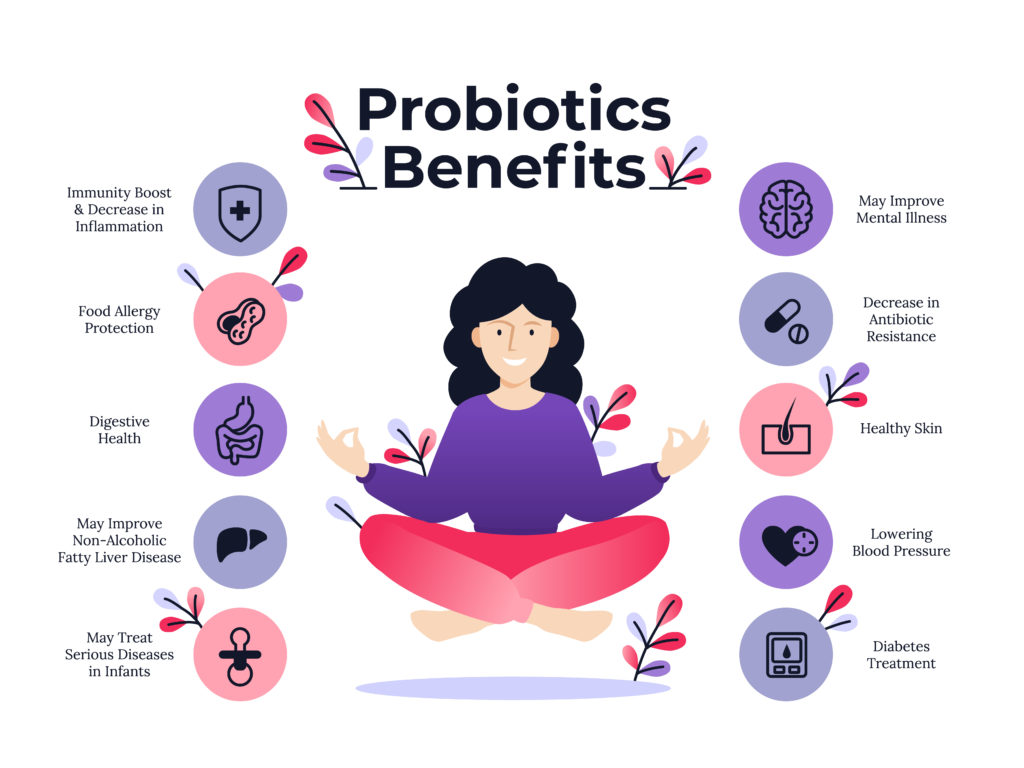You’ve probably seen probiotics advertised in yogurt, drinks, and food supplements before. Probiotics triumph as the third most commonly used dietary supplement, next to vitamins and minerals. Probiotics contain microorganisms and carry different strains of bacteria that are beneficial to us. Here is what you should know about probiotics and where to get them:
What are Probiotics?
People typically assume bacteria and other microorganisms pose detrimental health effects. Despite this, specific bacteria aid in food digestion, provide vitamins or break down cell-carrying diseases. Dr. Joseph Murray, a gastroenterologist at Mayo Clinic, states that probiotics are “beneficial bugs that are not pathogens.” Pathogens attack our bodies while microorganisms found in probiotics work to improve bodily functions.
What can be the health benefits of taking probiotics daily?
- Reduces inflammation: probiotics combat systemic inflammation which has been known to cause diseases
- Immune system: specific probiotic strains improve immune functions to lessen the likelihood of infections
- Blood pressure: reduces small spikes in blood pressure
- Skincare
- Has been shown to heal Eczema in children
- Can cures acne
- Treats rosacea
- Research indicates it may prevent the following;
- IBS
- Ulcerative colitis
- Crohn’s disease
- H. pylori (ulcer stimulant)
- Vaginal infections (yeast infections)
- UTI
- Periodic bladder cancer
- infection in the digestive tract caused by Clostridium difficile
- Helps with bowel issues
- Improves gut functioning
- Research reveals that probiotics with Lactobacillus GG can eliminate the progression of infectious diarrhea in adolescents and infants
- Aids constipation: decelerates “gut transit time.”

How can you take probiotics?
Many people take probiotics as a supplement. You can order them online or find them at a local pharmacy. Fermented food can also contain microorganisms. Examples of probiotic foods you may digest include yogurt, kefir, sauerkraut, tempeh, and kimchi.
Which probiotic is right for you?
In choosing a probiotic, you may want to consider which would best address your health concern. Gail Cresci, Ph.D., RD, an intestinal microbe specialist at Cleveland Clinic’s Department of Gastroenterology, Hepatology, and Nutrition notes that each probiotic serves different functions based on which microorganisms they contain. Cresci suggests, “I’d probably stay away from store brands and pay a little extra for the name brand that has been studied…look for a product that’s been tested for whatever you’re looking to address.”
Sources:
https://www.humnutrition.com/product/6/gut-instinct?utm_source=google&utm_medium=cpc&utm_campaign=Shopping%20-%20All%20Products&gclid=Cj0KCQjws_r0BRCwARIsAMxfDRgQuULaJxXrHzDDAMzyxerTHSAD0Wu6MMhFsP1jqjIKVVQ_kHL-7p4aAmSVEALw_wcB
https://www.healthline.com/nutrition/best-probiotic-supplement#section3



